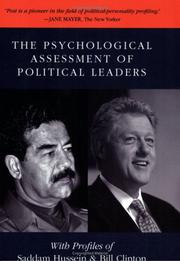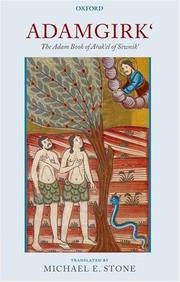| Listing 1 - 10 of 17 | << page >> |
Sort by
|
Book
ISBN: 9780815652885 0815652887 9780815610373 0815610378 Year: 2014 Publisher: Syracuse
Abstract | Keywords | Export | Availability | Bookmark
 Loading...
Loading...Choose an application
- Reference Manager
- EndNote
- RefWorks (Direct export to RefWorks)
Ḥaddād, Qāsim --- Hadad, Kassem --- حداد، قاسم --- قاسم حداد --- Haddad, Qassim --- Haddad, Qasem
Book
ISBN: 9783484523517 3484523514 9786612717048 1282717049 3484971274 9783484971271 9783111731353 3111731359 Year: 2009 Volume: 351 Publisher: Tübingen M. Niemeyer
Abstract | Keywords | Export | Availability | Bookmark
 Loading...
Loading...Choose an application
- Reference Manager
- EndNote
- RefWorks (Direct export to RefWorks)
L'interdizione linguistica, imponendo di evitare le parole evocative di emozioni paurose, è causa della polverizzazione del lessico. Inseguendo il moltiplicarsi dei referenti, vengono individuati i diversi settori, il più delle volte insospettati, entro i quali hanno agito nel passato (e spesso continuano ad agire) divieti di varia natura: il sentimento religioso, lo stupore e il timore di fronte ai grandi fenomeni atmosferici e geologici, i comportamenti misteriosi di molti insetti e animali, l'insorgere improvviso e inspiegabile di stati d'animo patologici e di malattie, la sessualità, la morte. Linguistic interdiction, with its imposition of avoiding evocative words of fearful emotions, is the cause of the pulverization of lexicon. Tracing the multiplication of referents, the diverse sectors within which prohibitions of various nature have operated in the past (and often continue to operate) are identified, in most cases in an unsuspected manner: the religious senti-ments, the wonder and fear in front of immense atmospheric and geological phenomena, the mysterious behaviour of many insects and animals, the sudden and unexplainable emergence of pathological and sickly state of mind, sexuality, death.
Italian language --- Dialects --- Lexicology. --- Lexicology --- Italian language -- Dialects -- Italy -- Adda River Valley -- Lexicology. --- Italian language -- Dialects -- Italy -- Adda River Valley. --- Italian language -- Dialects -- Italy. --- Italian language -- Dialects. --- Languages & Literatures --- Romance Languages --- Romance philology. --- Romance languages --- Italian language - Dialects - Italy - Adda River Valley - Lexicology
Book
ISBN: 9781107016859 9781107693487 9781139061506 9781139224840 1139224840 9781139221412 1139221418 113906150X 1139218328 9781139218320 1107016851 1107693489 9781139218320 1107230551 9781107230552 1280568895 9781280568893 1139223127 9781139223126 9786613598493 6613598496 113921523X Year: 2011 Publisher: Cambridge Cambridge University Press
Abstract | Keywords | Export | Availability | Bookmark
 Loading...
Loading...Choose an application
- Reference Manager
- EndNote
- RefWorks (Direct export to RefWorks)
During the 2003 war that ended Saddam Hussein's regime, coalition forces captured thousands of hours of secret recordings of meetings, phone calls and conferences. Originally prepared by the Institute for Defense Analyses for the Office of the Undersecretary of Defense for Policy, this study presents annotated transcripts of Iraqi audio recordings of meetings between Saddam Hussein and his inner circle. The Saddam Tapes, along with the much larger digital collection of captured records at the National Defense University's Conflict Records Research Center, will provide researchers with important insights into the inner workings of the regime and, it is hoped, the nature of authoritarian regimes more generally. The collection has implications for a range of historical questions. How did Saddam react to the pressures of his wars? How did he manage the Machiavellian world he created? How did he react to the signals and actions of the international community on matters of war and peace? Was there a difference between the public and the private Saddam on critical matters of state? A close examination of this material in the context of events and other available evidence will address these and other questions.
Hussein, Saddam at-Takriti --- Hussein, Saddam --- Authoritarianism --- History --- Hussein, Saddam, --- Friends and associates --- Political and social views --- Iraq --- Politics and government --- Political science --- Authority --- Ḥusayn, Ṣaddām, --- Tikrītī, Ṣaddām Ḥusayn, --- Takrītī, Ṣaddām Ḥusayn, --- Hussain, Saddam, --- Husain, Saddam, --- Ḥusayn, Ṣadām, --- Husein, Sadam, --- Ḣu̇sei̐n, Săddam, --- Khuseĭn, Saddam, --- Husain, Sadam, --- Abd al-Majid al-Tikriti, Saddam Ḥussein, --- Saddam Hussein, --- חוסין, צדאם --- حسين، صدام --- حسين، صدام، --- صدام حسين --- Friends and associates. --- Political and social views. --- Irak --- Rāfidayn, Bilād --- Bilād al-Rāfidayn --- Republic of Iraq --- Jumhuriyah al Iraqiyah --- Social Sciences --- Political Science --- Authoritarianism - Iraq - History - 20th century - Sources --- Hussein, Saddam, - 1937-2006 - Archives --- Hussein, Saddam, - 1937-2006 - Friends and associates --- Hussein, Saddam, - 1937-2006 - Political and social views --- Iraq - Politics and government - 1979-1991 - Sources --- Iraq - Politics and government - 1991-2003 - Sources --- Hussein, Saddam, - 1937-2006

ISBN: 0472068385 0472098381 1282597507 9786612597503 047202275X 9780472022755 9781282597501 661259750X 9780472068388 Year: 2005 Publisher: Ann Arbor : University of Michigan Press,
Abstract | Keywords | Export | Availability | Bookmark
 Loading...
Loading...Choose an application
- Reference Manager
- EndNote
- RefWorks (Direct export to RefWorks)
Social psychology --- Politicians. Diplomats --- Clinton, Bill --- Political leadership --- Heads of state --- Politicians --- Leadership politique --- Chefs d'Etat --- Hommes politiques --- Psychology --- Psychologie --- Hussein, Saddam, --- Heads of government --- Rulers --- State, Heads of --- Executive power --- Statesmen --- Leadership --- Psychological aspects. --- Psychology. --- Clinton, Bill, --- Blythe, William Jefferson, --- Clinton, William J. --- Clinton, William Jefferson, --- Kelindun, --- Ḳlinṭon, Bil, --- Klinton, Bill, --- Klinton, Uilʹi︠a︡m Dzhefferson, --- Klintūn, Bīl, --- Kurinton, Biru, --- Клинтон, Билл, --- קלינטון, ביל, --- كلينتون، بيل، --- クリントン, ビル, --- Ḥusayn, Ṣaddām, --- Tikrītī, Ṣaddām Ḥusayn, --- Takrītī, Ṣaddām Ḥusayn, --- Hussain, Saddam, --- Husain, Saddam, --- Ḥusayn, Ṣadām, --- Husein, Sadam, --- Ḣu̇sei̐n, Săddam, --- Khuseĭn, Saddam, --- Husain, Sadam, --- Abd al-Majid al-Tikriti, Saddam Ḥussein, --- Saddam Hussein, --- חוסין, צדאם --- حسين، صدام --- حسين، صدام، --- صدام حسين
Book
ISBN: 0190843349 0190843314 Year: 2018 Publisher: New York, New York : Oxford University Press,
Abstract | Keywords | Export | Availability | Bookmark
 Loading...
Loading...Choose an application
- Reference Manager
- EndNote
- RefWorks (Direct export to RefWorks)
'Compulsion in Religion' relies on extensive research with Ba'thist archives to investigate the roots of the religious insurgencies that erupted in Iraq following the American-led invasion in 2003.
Islam and state --- Islam and politics --- History. --- Hussein, Saddam, --- Ḥizb al-Baʻth al-ʻArabī al-Ishtirākī (Iraq) --- Iraq --- Politics and government --- Islam --- Politics and Islam --- Political science --- Mosque and state --- State and Islam --- State, The --- Ummah (Islam) --- Political aspects --- Ḥusayn, Ṣaddām, --- Tikrītī, Ṣaddām Ḥusayn, --- Takrītī, Ṣaddām Ḥusayn, --- Hussain, Saddam, --- Husain, Saddam, --- Ḥusayn, Ṣadām, --- Husein, Sadam, --- Ḣu̇sei̐n, Săddam, --- Khuseĭn, Saddam, --- Husain, Sadam, --- Abd al-Majid al-Tikriti, Saddam Ḥussein, --- Saddam Hussein, --- חוסין, צדאם --- حسين، صدام --- حسين، صدام، --- صدام حسين --- Baath Party (Iraq) --- Arab Baʻth Socialist Party (Iraq) --- ASBP --- A.S.B.P. --- Arabische Sozialistische Baʻth Partei (Iraq) --- Baʻat' (Iraq) --- Mifleget ha-Baʻat' (Iraq) --- Miflagah ha-teḥiyah ha-ʻArvit ha-sotsyalisṭit (Iraq) --- Parti arabe socialiste "Baas" (Iraq) --- Parti Baʾth arabe et socialiste (Iraq) --- Hizb al-Bath al-Arabi al-Ishtiraki (Iraq)
Book
ISBN: 1477305580 1477305572 Year: 2015 Publisher: Austin, [Texas] : University of Texas Press,
Abstract | Keywords | Export | Availability | Bookmark
 Loading...
Loading...Choose an application
- Reference Manager
- EndNote
- RefWorks (Direct export to RefWorks)
Saddam Hussein ruled Iraq as a dictator for nearly a quarter century before the fall of his regime in 2003. Using the Ba’th party as his organ of meta-control, he built a broad base of support throughout Iraqi state and society. Why did millions participate in his government, parrot his propaganda, and otherwise support his regime when doing so often required betraying their families, communities, and beliefs? Why did the “Husseini Ba’thist” system prove so durable through uprisings, two wars, and United Nations sanctions? Drawing from a wealth of documents discovered at the Ba’th party’s central headquarters in Baghdad following the US-led invasion in 2003, The Ba’thification of Iraq analyzes how Hussein and the party inculcated loyalty in the population. Through a grand strategy of “Ba’thification,” Faust argues that Hussein mixed classic totalitarian means with distinctly Iraqi methods to transform state, social, and cultural institutions into Ba’thist entities, and the public and private choices Iraqis made into tests of their political loyalty. Focusing not only on ways in which Iraqis obeyed, but also how they resisted, and using comparative examples from Hitler’s Germany and Stalin’s Russia, The Ba’thification of Iraq explores fundamental questions about the roles that ideology and culture, institutions and administrative practices, and rewards and punishments play in any political system.
Political parties --- Totalitarianism. --- Hussein, Saddam, --- Ḥizb al-Baʻth al-ʻArabī al-Ishtirākī (Iraq) --- History. --- Iraq --- Politics and government --- Totalitarian state --- Authoritarianism --- Collectivism --- Despotism --- Dictatorship --- Fascism --- National socialism --- Parties, Political --- Party systems, Political --- Political party systems --- Political science --- Divided government --- Intra-party disagreements (Political parties) --- Political conventions --- Ḥusayn, Ṣaddām, --- Tikrītī, Ṣaddām Ḥusayn, --- Takrītī, Ṣaddām Ḥusayn, --- Hussain, Saddam, --- Husain, Saddam, --- Ḥusayn, Ṣadām, --- Husein, Sadam, --- Ḣu̇sei̐n, Săddam, --- Khuseĭn, Saddam, --- Husain, Sadam, --- Abd al-Majid al-Tikriti, Saddam Ḥussein, --- Saddam Hussein, --- חוסין, צדאם --- حسين، صدام --- حسين، صدام، --- صدام حسين --- Baath Party (Iraq) --- Arab Baʻth Socialist Party (Iraq) --- ASBP --- A.S.B.P. --- Arabische Sozialistische Baʻth Partei (Iraq) --- Baʻat' (Iraq) --- Mifleget ha-Baʻat' (Iraq) --- Miflagah ha-teḥiyah ha-ʻArvit ha-sotsyalisṭit (Iraq) --- Parti arabe socialiste "Baas" (Iraq) --- Parti Baʾth arabe et socialiste (Iraq)

ISBN: 1429470240 9781429470247 0199204772 9780199204779 1383034427 Year: 2007 Publisher: London New York Oxford University Press
Abstract | Keywords | Export | Availability | Bookmark
 Loading...
Loading...Choose an application
- Reference Manager
- EndNote
- RefWorks (Direct export to RefWorks)
This is a translation of the Armenian epic poem on Adam and Eve, 'Adamgirk', composed by Arak'el of Siwnik' in the early 15th century. In parts the epic is in dialogue form between Adam, Eve, and God. It includes an introduction, which sets the work and its author in historical, religious, and literary context.
Fall of man --- Languages & Literatures --- Indo-Iranian Languages & Literatures --- Adam --- אדם --- آدم --- Адам --- Adem --- Adda --- Aadam --- Αδάμ --- Adán --- Adamo --- 아담 --- Adamu --- Ādams --- アダム --- Adami --- Addamu --- Aatami --- Aadama --- 亞當 --- Yadang --- Fall of man - Poetry --- Adam - (Biblical figure) - Poetry --- Adam - (Biblical figure)

ISBN: 9786612062995 1282062999 0253109035 9780253109033 025333490X 9780253334909 0253212715 9780253212719 6612062991 9781282062993 Year: 1999 Publisher: Bloomington, Indiana : Indiana University Press,
Abstract | Keywords | Export | Availability | Bookmark
 Loading...
Loading...Choose an application
- Reference Manager
- EndNote
- RefWorks (Direct export to RefWorks)
No other text has affected women in the western world as much as the story of "Eve and Adam". The story has engendered countless commentaries, has been used to argue the 'fallen' nature of humankind or to explain or exploit relations between the sexes, and has played a key role in justifying the ways of God toward man and woman. This remarkable anthology surveys more than 2,000 years of Jewish, Christian, and Muslim commentary on the biblical story that continues to raise fundamental questions about what it means to be a man or to be a woman.The selections range widely from early post biblical interpretations in the Apocrypha and Pseudepigrapha to three commentaries written especially for this volume. The editors have included early rabbinic texts, interpretations from the New Testament, and commentaries from the Church Fathers. There are excerpts from the Quran, from medieval Jewish commentaries, from Thomas Aquinas and other later figures, as well as representative texts of the Protestant Reformation. One section focuses on nineteenth-century America and the antebellum debate on slavery, the struggle for women's equality, and new religious movements such as Shakerism and Christian Science. Twentieth century texts from all three traditions conclude the volume. A special appendix focuses on race and Genesis 1-3 at the turn of the new millennium.The tale told through these texts is a remarkable one of the hold the story of "Eve and Adam" has had on the western imagination. The editors note that though the biblical account has been invoked throughout history to justify all manner of oppression, there is an equally rich tradition of egalitarian interpretation, well-represented in this book. Far from a collection of lifeless, historical documents, these texts are lively representatives of a debate that continues to animate men and women to this day.
Adam --- Eve --- חוה --- Ḥaṿah --- Ḥawwāh --- Khavah --- حواء --- Ḥawwāʼ --- אדם --- آدم --- Адам --- Adem --- Adda --- Aadam --- Αδάμ --- Adán --- Adamo --- 아담 --- Adamu --- Ādams --- アダム --- Adami --- Addamu --- Aatami --- Aadama --- 亞當 --- Yadang --- Bible. --- Criticism, interpretation, etc. --- History. --- Islamic interpretations --- Feminism - Religious aspects - Judaism. --- Feminism - Religious aspects - Christianity. --- Feminism - Religious aspects - Islam. --- Eve - (Biblical figure) --- Adam - (Biblical figure)
Book
ISBN: 0830897712 9780830897711 9780830824618 0830824618 Year: 2015 Publisher: Downers Grove
Abstract | Keywords | Export | Availability | Bookmark
 Loading...
Loading...Choose an application
- Reference Manager
- EndNote
- RefWorks (Direct export to RefWorks)
What if reading Genesis 2-3 in its ancient Near Eastern context shows that the creation account makes no claims regarding Adam and Eve's material origins? John Walton's groundbreaking insights into this text create space for a faithful reading of Scripture along with full engagement with science, creating a new way forward in the human origins debate.
Theological anthropology --- Man (Christian theology) --- Christianity. --- Adam --- Eve --- חוה --- Ḥaṿah --- Ḥawwāh --- Khavah --- حواء --- Ḥawwāʼ --- אדם --- آدم --- Адам --- Adem --- Adda --- Aadam --- Αδάμ --- Adán --- Adamo --- 아담 --- Adamu --- Ādams --- アダム --- Adami --- Addamu --- Aatami --- Aadama --- 亞當 --- Yadang --- Bible. --- Criticism, interpretation, etc.
Book
ISBN: 9780521149150 9780521193016 9781139223478 113922347X 9781139042949 1139042947 9781139220033 1139220039 052119301X 0521149150 1139209051 1107223210 1280568550 1139221760 9786613598158 1139216945 1139213873 9781139209052 9781107223219 9781280568558 9781139221764 6613598151 9781139216944 9781139213875 Year: 2012 Publisher: Cambridge Cambridge University Press
Abstract | Keywords | Export | Availability | Bookmark
 Loading...
Loading...Choose an application
- Reference Manager
- EndNote
- RefWorks (Direct export to RefWorks)
The Ba'th Party came to power in 1968 and remained for thirty-five years, until the 2003 US invasion. Under the leadership of Saddam Hussein, who became president of Iraq in 1979, a powerful authoritarian regime was created based on a system of violence and an extraordinary surveillance network, as well as reward schemes and incentives for supporters of the party. The true horrors of this regime have been exposed for the first time through a massive archive of government documents captured by the United States after the fall of Saddam Hussein. It is these documents that form the basis of this extraordinarily revealing book and that have been translated and analyzed by Joseph Sassoon, an Iraqi-born scholar and seasoned commentator on the Middle East. They uncover the secrets of the innermost workings of Hussein's Revolutionary Command Council, how the party was structured, how it operated via its network of informers and how the system of rewards functioned.
Internal politics --- Hussein, Saddam --- anno 1960-1969 --- anno 1970-1979 --- anno 1980-1989 --- anno 1990-1999 --- anno 2000-2009 --- Iraq --- Political parties --- Parties, Political --- Party systems, Political --- Political party systems --- Political science --- Divided government --- Intra-party disagreements (Political parties) --- Political conventions --- Hussein, Saddam, --- Ḥusayn, Ṣaddām, --- Tikrītī, Ṣaddām Ḥusayn, --- Takrītī, Ṣaddām Ḥusayn, --- Hussain, Saddam, --- Husain, Saddam, --- Ḥusayn, Ṣadām, --- Husein, Sadam, --- Ḣu̇sei̐n, Săddam, --- Khuseĭn, Saddam, --- Husain, Sadam, --- Abd al-Majid al-Tikriti, Saddam Ḥussein, --- Saddam Hussein, --- חוסין, צדאם --- حسين، صدام --- حسين، صدام، --- صدام حسين --- Ḥizb al-Baʻth al-ʻArabī al-Ishtirākī (Iraq) --- Baath Party (Iraq) --- Arab Baʻth Socialist Party (Iraq) --- ASBP --- A.S.B.P. --- Arabische Sozialistische Baʻth Partei (Iraq) --- Baʻat' (Iraq) --- Mifleget ha-Baʻat' (Iraq) --- Miflagah ha-teḥiyah ha-ʻArvit ha-sotsyalisṭit (Iraq) --- Parti arabe socialiste "Baas" (Iraq) --- Parti Baʾth arabe et socialiste (Iraq) --- Politics and government --- Social Sciences --- Political Science --- Hizb al-Bath al-Arabi al-Ishtiraki (Iraq)
| Listing 1 - 10 of 17 | << page >> |
Sort by
|

 Search
Search Feedback
Feedback About UniCat
About UniCat  Help
Help News
News